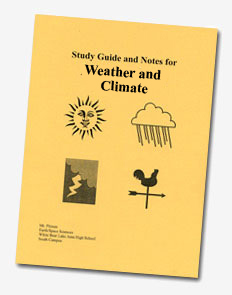Earth/Space Sciences
Weather and Climate: A Comprehensive Study of Earth’s Atmosphere
| Texts: | Earth Science (Tenth edition), Tarbuck and Lutgens Study Guide and Notes for Weather and Climate, Pitman Isaac's Storm, Erik Larson |
||
| Week | Schedule of Topics and Assignments | Reading | Quiz/Test |
| 1-2 | Introduction to Meteorology: The Study of Earth’s Weather Weather and the Atmosphere Composition and Structure of the Atmosphere Heat: The Driving Force behind the Weather Lab: Measurement of Earth’s Weather |
ch. 15, pp 404-417 | |
| 3-4 | Air Temperature and the Warming of the Atmosphere | ch. 15, pp 417-431 | Quiz 1 |
| 5-6 | Atmospheric Moisture: Evaporation, Condensation, and Humidity Cloud Development and Precipitation Lab: Temperature and Humidity |
ch. 16 | Quiz 2 Test 1 |
| 7-8 | Air Pressure and Winds | ch. 17, pp 468-478 | Quiz 3 |
| 9-10 | Atmospheric Circulation: Local Winds Global Circulation Systems Lab: Horizontal Air Motion and the General Circulation of the Atmosphere |
ch. 17, pp 478-491 | |
| 11-12 | Variability of Weather: Air Masses and Fronts Middle Latitude Cyclone Lab: Air Masses and Fronts |
ch. 18, pp 492-506 | Quiz 4 Test 2 |
| 13-14 | Weather Forecasting and Storm Prediction Lab : Surface Weather Map Analysis |
ch. 18, pp 506-521 Isaac's Storm |
Quiz: Isaac's Storm |
| 15-16 | Severe Storms Thunderstorms, Tornadoes, Hurricanes, Winter Storms |
Quiz 5 | |
| 17-18 | World Climate and Climate Change Lab: Climate Classification |
ch. 19 | Quiz 6 Test 3 |
Weather and Climate: Guidelines & Expectations

We are partners in learning. During this course, you will have the opportunity to discover things about Earth and the atmosphere that should amaze and fascinate you. I will make every effort to present this material in an interesting, informative, and provocative way. However, attending class and paying attention will probably not be all you need to do to achieve success here. I expect you to study at least 1 hour each day (7-10 hours/week), outside of class, so you may fully understand and assimilate this material. You need to make this effort.
Come to class on time. Students are expected to be in their assigned seat at the tone that marks the beginning of the period. Three or more unexcused tardies will result in disciplinary action. Each student is expected to exhibit appropriate classroom behavior. Disruptions and annoyances that interfere with students’ ability to learn will not be tolerated. The use of cell phones or other electronic devices will not be permitted during class.
Be prepared each day with your text (if requested), notebook, pen or pencil, calculator, and an active mind. Please don’t ask to borrow a pen, pencil, calculator, or mind.
If you miss a day, you miss a lot. It will be your responsibility to make up all work due to absence. Immediately upon your return to class, you should make an appointment with me to discuss what you have missed. Failure to do so may result in no credit (grade of 0) awarded for the assignments missed. Be sure to contact a responsible classmate to obtain notes you missed during your absence.
- You will have 1-day makeup time for each day you have an excused absence.
- If your absence is unexcused, no credit (grade of 0) will be given for that assignment.
- Missed assignments, labs, or tests must be made up after school on the assigned make-up date.
Assignments need to be completed on time. Work handed in late (except for absences noted above) will be marked down 50% for the first day late and will not be accepted beyond that time (grade of 0). You will be given sufficient time to complete your assignments. Many of these assignments require several days to complete. Do not wait until the night before the due date to attempt to complete your work.
Your submitted assignments must be just that...yours. Cheating, including plagiarism, will not be tolerated. Penalties for this type of infraction will be severe, up to and including an F in the course.
Grading Procedure: Students receive their grade based upon the total number of points earned from the following assessments:
| Tests and quizzes: | 40% | Grading scale: | A | 93-100 | A- | 90-92 | |||
| Laboratory exercises and observations: | 40% | B+ | 88-89 | B | 82-87 | B- | 80-81 | ||
| Class activities (i.e. projects, reports, homework): | 20% | C+ | 78-79 | C | 72-77 | C- | 70-71 | ||
| D+ | 68-69 | D | 62-67 | D- | 60-61 | ||||
| F | < 60 |
This is an elective course. I am assuming you are here because you want to learn about Earth's weather and climate. To do well, your work needs to be completed on time and be a reflection of your best efforts.
Please also take a moment to read this letter from the National Commission on Excellence in Education.